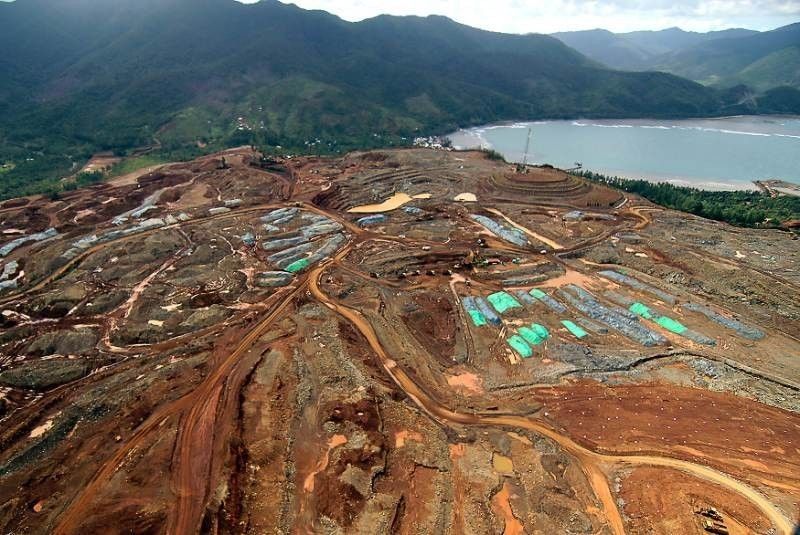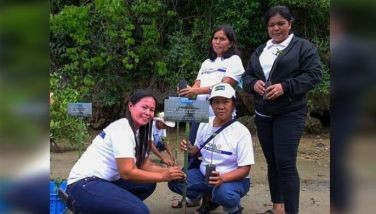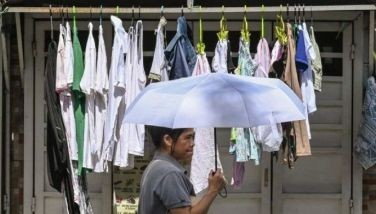Profits over planet and people? Green, indigenous groups oppose charter change

MANILA, Philippines (Update 1: February 18, 10:25 a.m.) — Amending the Constitution to loosen restrictions on foreign investments could heighten the risk of environmental degradation and pose a greater threat to local communities, especially indigenous peoples, groups have warned.
The government is pushing to propose amendments to the economic provisions of the 1987 Constitution, with President Ferdinand Marcos Jr. saying the charter “was not written for a globalized world.”
The Constitution limits the stake of foreign nationals and corporations in businesses at 40%.
“We have to adjust so that we can increase the economic activity in the Philippines, we can attract more foreign investors,” he said in an interview with GMA News in January.
The Philippines, however, has passed several laws that opened up the economy to the world without altering the charter such as the Public Services Act and Foreign Investment Act.
The push for amendments has sparked fears among environmental and indigenous groups that relaxing restrictions on foreign investments will hurt the environment and local communities.
“It renders the whole nation vulnerable to the destructive exploitation by foreign firms, whose primary motivation is profit over environmental protection and people’s welfare,” said Jaybee Garganera, national coordinator of Alyansa Tigil Mina (ATM).
ATM is one of the members of a new coalition campaigning against the push for charter change.
Extraction of natural resources
ATM pointed out that amending the Constitution could lead to an expansion of the extractive industries, particularly mining.
“The likely result would be flattened mountains, razed forests, choked rivers, ghost towns, and exacerbated impacts of climate change,” Garganera said, adding this would also lead to the loss of people’s livelihoods, health problems, and human rights violations.
A paper published by the Legal Rights and Natural Resources Center (LRC) in 2023 revealed that 60% of mineral deposits and mining projects in the Philippines are located in ancestral lands.
Mining is also linked to killings of environmental defenders, with rights organization Global Witness reporting that one-third of land defenders killed in the Philippines since 2012 opposed mineral extraction.
Republic Act 7942, or the Philippine Mining Act of 1995, already allows foreign-owned companies to engage in mining activities under a financial and technical assistance agreement with the Philippine government.
“RA 7942 legitimizes the plunder of our national patrimony,” Garganera said. “This situation will only worsen if ChaCha prospers and transnational corporations are allowed to act with impunity.”
Jon Bonifacio, national coordinator of Kalikasan People’s Network for the Environment, noted that multinational corporations “have abused the available space given to them under our current legal framework.”
He cited the social and environmental damage caused by mining operations of Australian-Canadian firm OceanaGold and the dredging and reclamation activities conducted by Dutch company Boskalis in Manila Bay.
“In the context of ongoing climate change and biodiversity loss, what we need is more regulation and a more mindful approach with regards to our environment—the complete opposite of what's in store for us with the proposed charter change,” Bonifacio told Philstar.com.
‘Exploitation, repression of IPs’
For KATRIBU Kalipunan ng Katutubong Mamamayan ng Pilipinas, lifting foreign ownership restrictions will further erode the control of indigenous peoples over their territories.
“Granting 100% foreign ownership of lands would exacerbate the dispossession of IP from their ancestral lands, adversely affecting their livelihoods, cultural heritage, and the environment,” KATRIBU national convenor Beverly Longid told Philstar.com.
Longid stressed that granting foreign ownership rights would “fully undermine” the right to free, prior, informed consent process (FPIC) required for any projects or activities on indigenous lands.
The lack of informed consent often leads to displacement and social fragmentation within indigenous communities, such as in the cases of Kaliwa-Kanan Laiban, Cabacanan, Jalaur, and Cordillera dams.
She added that foreign ownership will result in increased militarization of indigenous territories and human rights abuses, “perpetuating a cycle of suffering and injustice.”
“The proposed charter change would intensify the existing state of exploitation, repression, discrimination, and neglect experienced by indigenous peoples and the Bangsamoro,” Longid said.
The Center for Environmental Concerns-Philippines called for a “steadfast and sincere implementation” of the 1987 Constitution rather than pushing for charter change.
The group also urged lawmakers to pass the People’s Mining Bill and Environmental Defender’s Bill as well as review the Mining Act of 1995, Fisheries Code of 1998, Comprehensive Land Use Plan, and the Expanded National Integrated Protected Areas System Act of 2018 to ensure responsible environmental and natural resources management.
- Latest
























